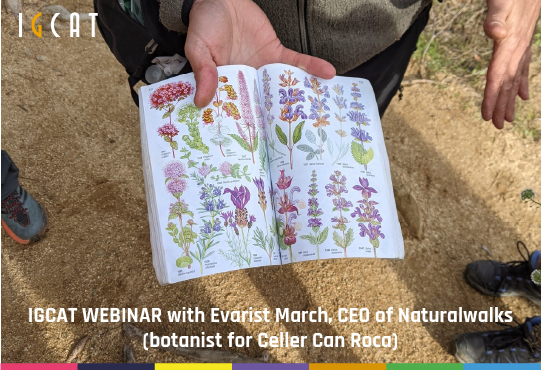Acknowledging the relationship between culture and nature, and its key role in transforming the territory in unique gastronomic experiences, was the theme of the webinar held by IGCAT Expert and CEO of NaturalWalks, Evarist March on 18 April 2023.
Moderated by IGCAT Board member, Omar Valdez from UNWTO Academy, the webinar focused on Evarist March’s extensive experience as a forager, gastro-botanist and consultant for the renown El Celler de Can Roca in Girona (Three MICHELIN Stars and MICHELIN Green Star restaurant), as well as his role as an Interpret Europe guide trainer in ecotourism, nature and heritage interpretation.
Drawing from Josep Pla’s concept that “cooking is putting the landscape in a pot,” Evarist highlighted the strong connection that certain plants, algae, fungi and wildlife have with the specific culture of the territory. This connection forms the basis to provide quality gastronomic visitor experiences that are unique to a destination and impossible to replicate anywhere else.
Underlining this linkage between territory and food is extremely urgent in an increasingly globalised world, where the same food and the same way of experiencing it can be found anywhere, often without a connection to the specific local culture and nature.
Traditional knowledge related to the landscape and its distinguishing elements is necessary to provide a meaningful and authentic visitor experience, which is not so much about selling a product, as it is about transmitting a territory, its values and its identity. Therefore, quality visitor experiences, whether they are promoting more traditional or more innovative approaches to food, need to be carefully designed and carried out starting from a deep analysis of the territory, its unique natural traits and their relationship with local cultures.
Replying to Omar Valdez’s question about the secrecy that often surrounds foraging communities such as mushrooms pickers, who never reveal where the best spots to collect mushrooms are, Evarist emphasised that sustainability plays a key role in this approach, to ensure the preservation of the species that would be otherwise compromised by an intensive foraging activity.
IGCAT Experts Virginie Brégeon and Caroline Couret invited a reflection on what type of visitors participate in the experiences provided by NaturalWalks. Although for the majority these are people who already have an interest in sustainability and look for niche experiences in nature, Evarist recognised that after the Covid-19 pandemic, visitors are in general more receptive towards these topics.
Virginie Brégeon further noted that Brittany’s tourism department worked in ten different food territories, in collaboration with local people and experts, to identify their unique characteristics and ingredients, as well as to preserve local food knowledge and recipes that are being forgotten. The initiative aimed to attract visitors from outside the region to get to know all these different areas, as well as people from Brittany to discover more about the different identities within their own region.
IGCAT Expert Dezső Kovács mentioned a biologist in Hungary who collects edible wild plants and flowers and then cooks with them. Her blog is followed by over 25.000 people and allows her to popularise useful but forgotten traditional knowledge on how to identify and preserve local plant varieties and make good food out of them.
Omar Valdez prompted a final thought on how to transmit this kind of knowledge and approach towards the territory to schools. A challenge worth exploring for IGCAT and the World Regions of Gastronomy Platform to educate the younger generations.
About IGCAT
IGCAT aims to empower local communities by raising awareness of the importance of protecting and promoting distinct regional food, culture, arts and natural assets as part of sustainable and balanced tourism and development strategies. This is essential to safeguarding our planet, health, wellness and local economies.
IGCAT is a non-profit institute established in 2012, working with regional stakeholder consortiums in the fields of gastronomy, culture, arts and tourism. It counts on the expertise of a worldwide network of experts and works in partnership with specialised intergovernmental organisations.
IGCAT founded the World/European Region of Gastronomy Award and is the official secretariat for the World/European Regions of Gastronomy Platforms. Furthermore, the Institute has developed the European Young Chef Award, the World Food Gift Challenge, the Top Websites for Foodie Travelers Award and the international Food Film Menu.
About the World/European Regions of Gastronomy
World/European Regions of Gastronomy, guided by IGCAT, are working together to strengthen food security through the celebration of distinctive food cultures; create employment by stimulating creativity and gastronomic innovation; nourish children and adults through culinary and cultural education; driving environmental sustainability in tourism, hospitality and agricultural sectors; supporting balance and sustainable tourism practices; highlighting and supporting expertise from within rural and urban communities, creating connections and sharing good practices; and contributing to community health and well-being.
3 May 2023
